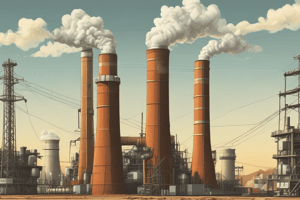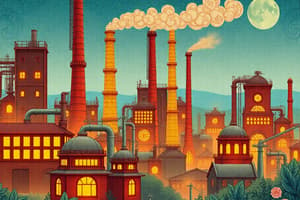Podcast
Questions and Answers
Which of these are conventional fossil fuels?
Which of these are conventional fossil fuels?
- Solar energy
- Wind energy
- Coal (correct)
- Natural gas (correct)
What is the largest source of daily energy consumption?
What is the largest source of daily energy consumption?
- Renewables
- Hydropower
- Fossil fuels (correct)
- Nuclear energy
What are the four types of fossil fuels mentioned?
What are the four types of fossil fuels mentioned?
Coal, natural gas, gasoline, diesel.
What percentage of energy comes from petroleum?
What percentage of energy comes from petroleum?
What is coal?
What is coal?
Coal is primarily consumed in the regions where it is produced.
Coal is primarily consumed in the regions where it is produced.
Fossil fuels form an important part of our daily energy needs, accounting for about ___% of energy consumption.
Fossil fuels form an important part of our daily energy needs, accounting for about ___% of energy consumption.
What is the primary usage of coal?
What is the primary usage of coal?
Which ancient organic matter formation process is responsible for the creation of fossil fuels?
Which ancient organic matter formation process is responsible for the creation of fossil fuels?
Match the following engines to their type:
Match the following engines to their type:
What are the two types of analyses for coal mentioned?
What are the two types of analyses for coal mentioned?
Flashcards are hidden until you start studying
Study Notes
Fossil Fuels
- Fossil fuels are the primary energy sources for most energy conversion devices, such as steam turbines, gas turbines, petrol engines, and diesel engines.
- Fossil fuels are important for daily energy needs, contributing to approximately 80% of global energy consumption.
Types of Fossil Fuels
- Conventional Fossil Fuels: Coal, natural gas, and petroleum.
- Solid Fuels: Coal, biomass, petroleum coke
- Liquid Fuels: Gasoline, diesel, jet fuel, fuel oils
- Natural Gas: Methane, ethane, propane, butane
- Coal is the most abundant fossil fuel, historically important for the Second Industrial Revolution, and currently used for electric power generation, steelmaking, and cement production.
- Oil and gas originate from ancient marine organic matter.
- Petroleum is a complex mixture of hydrocarbons.
Global Carbon Cycle
- Photosynthesis is the process where plants convert solar energy, carbon dioxide, and water into sugars and oxygen.
- Decay process decomposes organic matter, releasing carbon dioxide back into the atmosphere.
Coal Formation
- Coal is formed from ancient plant material subjected to high pressure, geological forces, and temperatures over millions of years.
- Temperature with depth in the Earth increases, transforming peat into coal.
Coal Analysis
- Proximate Analysis determines moisture, volatile matter, ash content, and fixed carbon.
- Ultimate Analysis determines carbon, hydrogen, nitrogen, sulfur, and oxygen content.
Basis of Analysis
- As Received Basis: The analysis reflects the composition of the coal as it is received.
- Dry Basis: Moisture is removed before analysis.
- Dry, Ash-Free Basis: Moisture and ash are removed before analysis.
- Conversion of Basis allows for comparison of coal samples with different moisture and ash content.
Studying That Suits You
Use AI to generate personalized quizzes and flashcards to suit your learning preferences.





